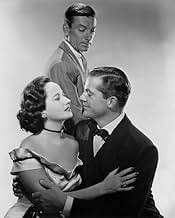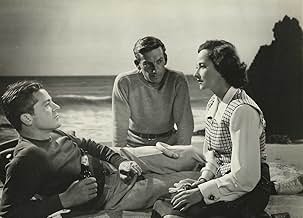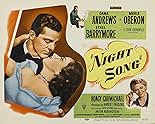अपनी भाषा में प्लॉट जोड़ेंWhen a beautiful socialite falls in love with an embittered composer who is blind, she feigns blindness herself in order to get closer to him.When a beautiful socialite falls in love with an embittered composer who is blind, she feigns blindness herself in order to get closer to him.When a beautiful socialite falls in love with an embittered composer who is blind, she feigns blindness herself in order to get closer to him.
- पुरस्कार
- कुल 4 जीत
Whit Bissell
- Party Guest
- (बिना क्रेडिट के)
Leonard Bremen
- Chez Mamie Headwaiter
- (बिना क्रेडिट के)
Charles Cirillo
- Sailor at Chez Mamie
- (बिना क्रेडिट के)
Angela Clarke
- Woman
- (बिना क्रेडिट के)
George Cooper
- Bellboy
- (बिना क्रेडिट के)
Lynn Craft
- Party Guest
- (बिना क्रेडिट के)
Suzi Crandall
- Fur-Coated Pedestrian
- (बिना क्रेडिट के)
Herbert Evans
- Butler
- (बिना क्रेडिट के)
फ़ीचर्ड समीक्षाएं
The job of a movie is to give the audience members a bigger slice of life than they would normally experience. Night Song, a classic movie of the post-war 1940's, gives that slice of life with rare grace, elegance and style. Critics have panned it because of the "bad" far-fetched plot, the "bad" music, and "bad" acting.
I like this movie because, quite coincidentally, I personally have digested many of the slices of life in the "far-fetched" plot. The movie is about a piano player/composer who is struck on the head in the prime of his life. I am a piano player/composer who was struck on the head in the prime of my life. We both made it through a war era untouched, he WWII, and I Vietnam, well almost. He is living hand to mouth with his best friend. I am also living hand to mouth with my best friend, my wife. For those who love far-fetched coincidences: The composer's last name is Evans—my grandfather's name before he changed it. The movie was probably shot in 1946, the year I was born. Exactly 20 years later I saw Artur Rubenstein, who acted and performed in this movie, in a concert at the Music Center in Los Angeles--the only time I ever went to such a concert. It opened in Sweden on my birthday. What could be more far-fetched?. The not so far-fetched plot twists were not lost on me. As I watched, I was saying to myself, "What is possible for me? Miracles happen every day! Every success story was improbable before it happened!" After watching the film, I went over to the piano and played my own unfinished concerto once again!
As for the Leith Stevens music, if you didn't like it, say so. If it didn't touch you, say so. I liked it, immensely. It touched me immensely! If you want a thrill, type in Leith Stevens on IMDb. You'll find page after page of musical credits—right up to 2005! The man is a modern master composer played by the greatest performers of that time in this movie! Not bad for "bad" music! The job of film critics is to say what they like and dislike about films and why. They should leave all categorical good and bad thoughts completely out of the conversation.
One measure of the talent of an actor, and some say the only measure of a film, is the ability to transport the mind and the spirit of the viewer to another time and place. I was completely transported by this movie. I was perfectly comfortable with ALL the performances, by some of the most distinguished actors of the era, because I was ready, willing and able to be transfixed; and this film is transfixing! Let's get it on DVD!
I like this movie because, quite coincidentally, I personally have digested many of the slices of life in the "far-fetched" plot. The movie is about a piano player/composer who is struck on the head in the prime of his life. I am a piano player/composer who was struck on the head in the prime of my life. We both made it through a war era untouched, he WWII, and I Vietnam, well almost. He is living hand to mouth with his best friend. I am also living hand to mouth with my best friend, my wife. For those who love far-fetched coincidences: The composer's last name is Evans—my grandfather's name before he changed it. The movie was probably shot in 1946, the year I was born. Exactly 20 years later I saw Artur Rubenstein, who acted and performed in this movie, in a concert at the Music Center in Los Angeles--the only time I ever went to such a concert. It opened in Sweden on my birthday. What could be more far-fetched?. The not so far-fetched plot twists were not lost on me. As I watched, I was saying to myself, "What is possible for me? Miracles happen every day! Every success story was improbable before it happened!" After watching the film, I went over to the piano and played my own unfinished concerto once again!
As for the Leith Stevens music, if you didn't like it, say so. If it didn't touch you, say so. I liked it, immensely. It touched me immensely! If you want a thrill, type in Leith Stevens on IMDb. You'll find page after page of musical credits—right up to 2005! The man is a modern master composer played by the greatest performers of that time in this movie! Not bad for "bad" music! The job of film critics is to say what they like and dislike about films and why. They should leave all categorical good and bad thoughts completely out of the conversation.
One measure of the talent of an actor, and some say the only measure of a film, is the ability to transport the mind and the spirit of the viewer to another time and place. I was completely transported by this movie. I was perfectly comfortable with ALL the performances, by some of the most distinguished actors of the era, because I was ready, willing and able to be transfixed; and this film is transfixing! Let's get it on DVD!
Bearing more than a distant resemblance with "magnificent obsession" ,Stahl's tear jerker of the thirties (remade by Douglas Sirk in the fifties )"Night Song " is less melodramatic ,but ,mainly in its second part ,drags on a little bit;the movie features two real life musicians :Arthur Rubinstein in the flesh ,and Hoagy Carmichael whose songs were covered even by Beatle George Harrison ("Baltimore Oriole"," Hong Hong Blues) and his influence shows in McCartney's song "baby's request" .
Dana Andrews is reliable as ever ,and Madame Barrymore provides good support (dig the line when she tells her niece that all she wants is peace);Merle Oberon's playing is a bit emotionally remote ;the music is omnipresent ,classical stuff or Carmichael's "monkey song" .But the story itself is a bit derivative.
Dana Andrews is reliable as ever ,and Madame Barrymore provides good support (dig the line when she tells her niece that all she wants is peace);Merle Oberon's playing is a bit emotionally remote ;the music is omnipresent ,classical stuff or Carmichael's "monkey song" .But the story itself is a bit derivative.
This film predates my birth by ten years, but after just seeing it on TCM, I had to weigh in. Overlong? ...well probably, and certainly contrived, given the plot. But somehow, it works, and does so beautifully.
Both Andrews and Oberon do the best they can with their characters: he, a blind pianist playing in dives; she, a wealthy socialite who likes to go slumming. Enamoured by him, she feigns blindness in order to insinuate her way into his bitter existence. Both Hoagy Charmichael and stalwart Ethel Barrymore add comic bite and the requisite amount of wisdom as they lend their support to the ruse. And there are some cleaver twists which keep the game running just when one would think they would otherwise send it careening off the tracks. And it's hard for me to think of another film in which Merle Oberon was more beautiful.
Set your reality check to its lowest setting and enjoy this classic sudser. And, if you're not a fan of classical music, this film just might change that!
Both Andrews and Oberon do the best they can with their characters: he, a blind pianist playing in dives; she, a wealthy socialite who likes to go slumming. Enamoured by him, she feigns blindness in order to insinuate her way into his bitter existence. Both Hoagy Charmichael and stalwart Ethel Barrymore add comic bite and the requisite amount of wisdom as they lend their support to the ruse. And there are some cleaver twists which keep the game running just when one would think they would otherwise send it careening off the tracks. And it's hard for me to think of another film in which Merle Oberon was more beautiful.
Set your reality check to its lowest setting and enjoy this classic sudser. And, if you're not a fan of classical music, this film just might change that!
10whpratt1
This was a very outstanding film for viewers who loved Merle Oberon, Dana Andrews, Ethel Barrymore and Hoagy Carmichael during the height of their careers in 1948. In this film, Cathy,(Merle Oberon),"The Broken Melody",'34, a rich woman who falls deeply in love with Dana Andrews,(Dan),"The Best Years of Our Lives",'46, who is blind and is a down and out piano player and composer. Dan has a great pal who is also a musician and they work and live together in a Jazz club and try to make ends meet. Dan's buddy is Hoagy Carmichael,(Chick),"To Have & Have Not",'44 who gives a great supporting role and is quite funny through out the entire picture. There is plenty of Classical music and a great appearance of a famous conductor and pianist. The is lots of romance, drama and comedy and a very unusual ending.
NIGHT SONG might only appear to be a routine example of the kind of postwar romance that most of the major studios produced. A blind bar pianist (Dana Andrews) is taken up by a wealthy socialite (Merle Oberon), who pretends to be blind herself in order to secure his confidence. After a courtship in San Francisco, the pianist is given sufficient financial backing to have an operation to restore his sight, and receive a concert premiere of his new concerto at Carnegie Hall, New York. He returns to San Francisco, where he meets his beloved, and the two them vow eternal love.
Frank Renton and Dick Irving Hyland's screenplay contains its fair share of intertexts. The idea of a concert performance dates back to Brian Desmond Hurst's huge British wartime hit DANGEROUS MOONLIGHT (1941), that contained the premiere of Addinsell's "Warsaw Concerto," while Andrews's predicament as a war-scarred survivor cross- references Goldwyn's THE BEST YEARS OF OUR LIVES (1946), in which the actor had given an equally memorable characterization in a similar role.
Yet nonetheless NIGHT SONG possesses a certain integrity. Director John Cromwell establishes a close bond between Andrews and his boon companion Chick (Hoagy Carmichael, who even gets a solo number), and by doing so suggests the importance of male bonding in an often uncertain world. No one, it seems, knows really what to do with the peace, after having won the war; the only outlet both men can find is playing bands in some cheap SF dive bars.
This relationship is contrasted with the more spiky friendship between Oberon and her boon companion Miss Willey (Ethel Barrymore). The grande dame of the American theater gives one of her more commanding characterizations as a supposed cynic with a heart of gold, who readily understands the agonies her younger friend experiences as she tries to woo the pianist without hurting his feelings. In an environment where people seldom gave vent to their emotions in public, emotional expression is put at a premium.
The end of the movie is enlivened by a live performance from Leopold Stokowski and Eugeme Ormandy playing themselves with the New York Philharmonic Orchestra. They do not have to do much, but they set about delivering the concerto (with music by Leith Stevens) with a conviction and gusto that is truly refreshing.
Frank Renton and Dick Irving Hyland's screenplay contains its fair share of intertexts. The idea of a concert performance dates back to Brian Desmond Hurst's huge British wartime hit DANGEROUS MOONLIGHT (1941), that contained the premiere of Addinsell's "Warsaw Concerto," while Andrews's predicament as a war-scarred survivor cross- references Goldwyn's THE BEST YEARS OF OUR LIVES (1946), in which the actor had given an equally memorable characterization in a similar role.
Yet nonetheless NIGHT SONG possesses a certain integrity. Director John Cromwell establishes a close bond between Andrews and his boon companion Chick (Hoagy Carmichael, who even gets a solo number), and by doing so suggests the importance of male bonding in an often uncertain world. No one, it seems, knows really what to do with the peace, after having won the war; the only outlet both men can find is playing bands in some cheap SF dive bars.
This relationship is contrasted with the more spiky friendship between Oberon and her boon companion Miss Willey (Ethel Barrymore). The grande dame of the American theater gives one of her more commanding characterizations as a supposed cynic with a heart of gold, who readily understands the agonies her younger friend experiences as she tries to woo the pianist without hurting his feelings. In an environment where people seldom gave vent to their emotions in public, emotional expression is put at a premium.
The end of the movie is enlivened by a live performance from Leopold Stokowski and Eugeme Ormandy playing themselves with the New York Philharmonic Orchestra. They do not have to do much, but they set about delivering the concerto (with music by Leith Stevens) with a conviction and gusto that is truly refreshing.
क्या आपको पता है
- ट्रिवियाDana Andrews wore opaque contact lenses throughout filming to give him a realistic sensation of blindness.
- गूफ़When Chick begins singing the verses on the song "Who Kill Er", you hear horn riffs playing in the background. But when it cuts to the horn players on stage, they are sitting still and not playing although you can hear the horns in the music.
- भाव
Miss Willey: My heart's an old wastepaper basket, filled with unpaid bills and paperback novels.
- कनेक्शनFeatured in Let's Go to the Movies (1949)
- साउंडट्रैकI COULDN'T SLEEP A WINK LAST NIGHT
(uncredited)
from Higher and Higher (1943)
Music by Jimmy McHugh
Performed by "Chick Morgan Band"
टॉप पसंद
रेटिंग देने के लिए साइन-इन करें और वैयक्तिकृत सुझावों के लिए वॉचलिस्ट करें
- How long is Night Song?Alexa द्वारा संचालित
विवरण
- रिलीज़ की तारीख़
- कंट्री ऑफ़ ओरिजिन
- भाषा
- इस रूप में भी जाना जाता है
- Mi corazón te guía
- फ़िल्माने की जगहें
- Broad Beach, मालिबू, कैलिफोर्निया, संयुक्त राज्य अमेरिका(aka Trancas Beach - beach scenes)
- उत्पादन कंपनियां
- IMDbPro पर और कंपनी क्रेडिट देखें
बॉक्स ऑफ़िस
- US और कनाडा में सकल
- $17,00,000
- चलने की अवधि1 घंटा 42 मिनट
- रंग
- पक्ष अनुपात
- 1.37 : 1
इस पेज में योगदान दें
किसी बदलाव का सुझाव दें या अनुपलब्ध कॉन्टेंट जोड़ें




































